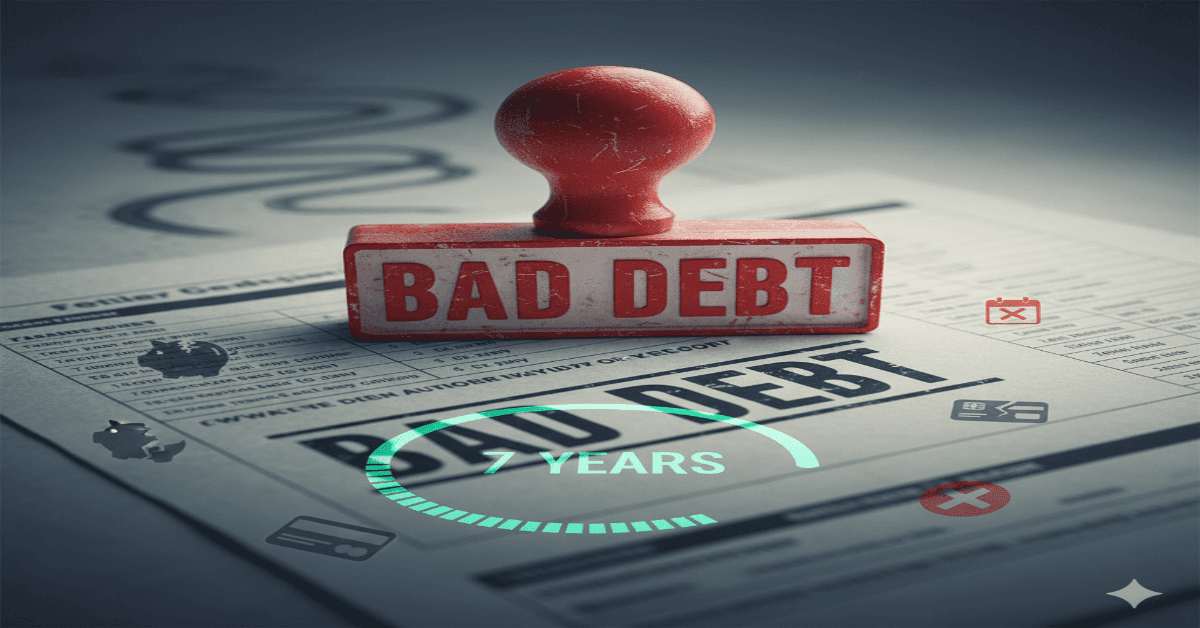How Long Does Bad Debt Stay on Your Record?
How Long Does Bad Debt Stay on Your Record?
One of the most upsetting financial burdens that Americans currently deal with is bad debt. Bad debt can permanently damage your credit history, regardless of whether it originates from overdue credit card bills, medical costs, or an outstanding personal loan. How long does bad debt remain on your credit report? is one of the most often asked questions.
The type of debt, how it was managed, and the laws governing credit reporting in the US all influence the response. The timeframe for various types of bad debt, its effects on your credit score, and recovery strategies will all be covered in this article.
HSBC Cashback Credit Card 2025 – Benefits, Rewards & How to Apply?

Bad Debt: What Is It?
The phrase “bad debt” is frequently used to refer to unpaid debt that is unlikely to be recouped by the lender. When a borrower doesn’t make payments for a predetermined amount of time, it usually ends up in collections or as a charge-off.
Bad debt examples include:
- Unpaid credit card debt that has been outstanding for several months.
- Submitted to a collections agency for medical costs.
- Installment debts or personal loans that are past due.
- Utility bills or service bills left unpaid.
Once debt becomes “bad,” it affects not just your relationship with the creditor but also your credit history and score.
For what length of time does bad debt remain on your credit record?
The guidelines for how long bad items stay on your credit report are established by the Fair Credit Reporting Act (FCRA). Bad debt often remains on your record for seven years after the initial payment that was missed and resulted in delinquency.
This is a summary:
- Late Payments – Up to 7 years.
Even a single late payment can stay on your credit report for seven years, though its impact lessens over time.
- Charge-Offs – Up to 7 years.
When a lender writes off debt as uncollectible, it becomes a charge-off, which is reported for seven years.
- Collections Accounts – Up to 7 years.
If your debt is sold to a collection agency, that account also stays for seven years from the date of delinquency.
- Bankruptcy – 7 to 10 years.
Chapter 7 bankruptcies remain for 10 years, while Chapter 13 remains for 7 years.
- Foreclosures & Repossessions – Up to 7 years.
The key detail is that the “clock” begins from the date of the first delinquency, not from when the collection agency takes over.
Does Bad Debt Get Off Your Record When You Pay It Off?
The idea that bad debt is immediately removed when it is paid off is one of the most widespread misconceptions regarding credit reports. Regretfully, that isn’t true.
- When a collection account is paid off, it is updated to “paid” but remains there.
- The account will continue to exist for the whole reporting period, which is typically seven years.
- Lenders, however, prefer compensated collections over unpaid ones.
This implies that even while the negative item remains, once you pay off the debt, its impact on your credit score may improve.
Bad Debt’s Effect on Your Credit Score
Bad debt significantly lowers your credit score, which is determined by a number of criteria.
History of Payments (35%).
The most detrimental element is late and missed payments.
Sums Due (30%)
Risk is increased by high balances in relation to your credit limit.
Credit History Length (15%)
Consistent payouts over a lengthy period of time can offset drawbacks.
Mix of Credit (10%)
Having multiple accounts can help mitigate some of the harm.
Fresh Credit (10%)
When finances are tight, submitting too many applications can lower scores.
State Laws and Debt Collection Rules
While the FCRA governs reporting, states also have statutes of limitations on debt collection. This is the time frame during which creditors can legally sue you for unpaid debts.
- Most states set this between 3–6 years.
- Some states extend it up to 10 years.
- After the statute expires, you still owe the debt, but collectors cannot sue you to force payment.
It’s important to note: the statute of limitations is not the same as the credit reporting period. Even if a debt is past the time for legal collection, it may still show on your credit report for the full 7 years.
Is it possible to get bad debt removed early from your credit report?
There are a few ways consumers can attempt to remove bad debt earlier than the standard reporting period:
Goodwill Letter
You can write to the creditor requesting removal, especially if you’ve otherwise been a reliable customer.
Dispute Inaccuracies
If a debt is reported incorrectly, you can dispute it with credit bureaus.
Pay-for-Delete Agreements
Some collection agencies may agree to remove the record if you pay in full. (Not all agencies accept this.)
Credit Repair Services
Professionals may help negotiate with creditors, though results vary.
While removal is possible, it’s not guaranteed. Still, as the debt ages, its impact naturally decreases.
Ways to Get Rid of Bad Debt
You are not always locked in your financial situation, even though bad debt can persist for years. Consistent effort can lead to recovery.
Pay down outstanding debts
Pay off collections or settle them for less than what is owed first. Long-term, this improves your financial situation.
Establish a Good Credit Record
- Use a credit card that is secured.
- Maintain low balances.
- Pay on schedule.
Keep an eye on your credit report
At least once a year, review your Equifax, Experian, and TransUnion reports. It is possible to contest errors.
Steer clear of new bad debt
Make a budget and follow it. While restoring your credit score, stay away from pointless credit applications.
Get Financial Guidance
Nonprofit organizations can assist in negotiating with creditors and developing debt management plans.
Timeline of Bad Debt on Your Record
| Type of Debt/Negative Item | Time on Credit Report | Notes |
| Late Payments | 7 years | Impact lessens after 2–3 years |
| Collections | 7 years | From date of delinquency |
| Charge-Offs | 7 years | Same as collections |
| Foreclosure | 7 years | Major negative impact |
| Repossession | 7 years | Applies to auto loans, etc. |
| Chapter 13 Bankruptcy | 7 years | Debts restructured |
| Chapter 7 Bankruptcy | 10 years | Debts discharged fully |
| Civil Judgments (old cases) | 7 years | Reporting rules vary |
In Conclusion: How Long Does Bad Debt Stay on Your Record
Although bad debt is a significant financial setback, it is temporary. The majority of negative items, such as collections, charge-offs, and late payments, remain on your record for seven years under the Fair Credit Reporting Act. Bankruptcy may persist for up to ten years.
Although bad debt cannot be immediately eliminated, its effects can be lessened by making account payments, challenging mistakes, and developing good credit practices. Even the worst credit history gradually improves, making financial rehabilitation possible.
The Hidden Dangers of Leveraged ETFs: What Every Investor Must Know
The Hidden Dangers of Leveraged ETFs: What Every Investor Must Know
